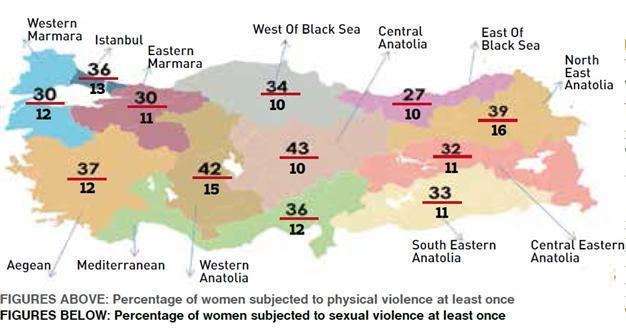Women face violence all over Turkey
Umut Erdem ANKARA
 Women face violence in many fields across Turkey, but the type of harassment differs according to geographical regions, a new Family Ministry report has shown.
Women face violence in many fields across Turkey, but the type of harassment differs according to geographical regions, a new Family Ministry report has shown.The study, which divides the country into 12 regions, showed that sexual violence is most prevalent in northeastern Anatolia, while physical violence is widespread in Central Anatolia.
The survey, which was not announced to the public, but submitted to a parliamentary commission that works on violence against women, also showed that the women in Istanbul are not much less victimized by physical violence compared to Central Anatolia. Some 36 percent of the women in Turkey's largest city have faced physical violence in their lifetime, and 8 percent have suffered from violence in the last 12 months, according to the survey.
The study was conducted by Hacettepe University and was finalized at the end of last year. It categorizes violence under “physical,” “sexual,” “emotional,” “economic” and “insistent harassment [stalking],” with a more detailed report of the figures to be released soon.
Some 43 percent of women in Central Anatolia, which is known as a conservative region, said they have faced physical violence at one point in their lives, followed by Western Anatolia at 42 percent, and 27 percent in the eastern Black Sea region.
Some 16 percent of women in northeast Anatolia were subject to sexual violence, and 8 percent were victimized in the last 12 months. Istanbul is above the national average in this category at 13 percent, while 10 percent of Western Black Sea and Central Anatolian women said they were subject to sexual violence.
Meanwhile, Western Anatolia is the peak of "emotional violence" at 54 percent, while the lowest proportion of women reporting this type of harassment is in the Eastern Marmara region at 35 percent.
Four out of every 10 women face violence, according to Aylin Nazlıaka, an Ankara deputy of the main opposition Republican People’s Party (CHP), speaking during a press conference at parliament on Jan. 26. However, 89 percent of them do not apply to the authorities because they usually do not know what to do, Nazlıaka added.
She also criticized the government's recently unveiled family package promoting motherhood, saying it was an attempt to “put women into darkness.”
“The only thing they care about is having women give birth, like incubators,” Nazlıaka said.
















